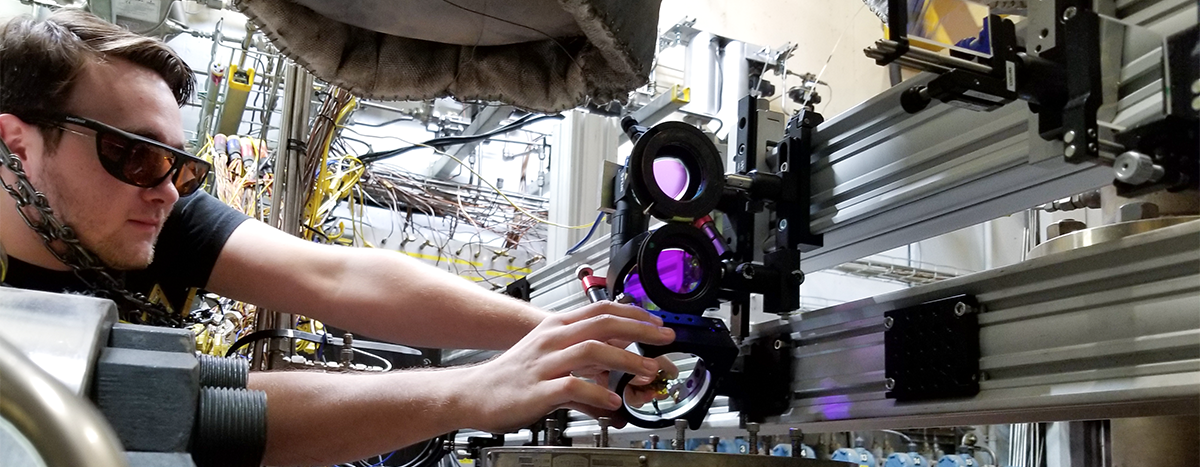
AE Ph.D. candidate Sam Wonfor aligns a laser measurements systems during a collaborative experimental campaign at GE Research in Niskayuna, New York.
The Daniel Guggenheim School is preparing to embark on four multidisciplinary team research projects as part of NASA’s University Leadership Initiative (ULI). The initiative gives the academic community an opportunity to support NASA’s aeronautical research goals and provides students with valuable experience in solving real-world technical challenges.
Professor Adam Steinberg will serve as the principal investigator for the Georgia Tech-led project, which addresses environmental challenges related to the emerging supersonic transport market. The Georgia Tech team – which also includes Prof. Ellen Mazumdar and Dr. Jimmy Tai – will be joined by partners from Aerodyne Research Inc., General Electric, Massachusetts Institute of Technology, Missouri University of Science and Technology, Spelman College, and Virginia Tech.
“We’re excited to get started on this project and contribute to new technologies that will produce cleaner aircraft in the future,” said Steinberg. “Flying faster presents new environmental challenges, both in terms of the amount of emissions produced and their impact. We are taking a holistic approach that aims to co-optimally develop cleaner engine technologies and aviation systems through the lens of environmental impact”.
Experiments in the Ben T. Zinn Combustion Lab at Georgia Tech – leveraging state-of-the-art measurement techniques from Aerodyne, Missouri S&T, and Virginia Tech – will help advance and evaluate a novel combustor to reduce emissions at the rather unusual conditions found in supersonic engines. The resultant data will be used by Georgia Tech’s Aerospace Systems Design Lab (ASDL) to create engine cycles and predict emissions from fleets of supersonic aircraft. MIT’s Laboratory for Aviation and Environment will assess the environmental impact of the supersonic fleet, providing policy guidance and feedback to the technology- and system-level studies. GE brings their expertise in combustor and engine design, ensuring knowledge transfer and practical impact.
Another key ULI goal is for students to gain experience in multidisciplinary teams from other universities and industry, including student populations with introductory STEM experience or who have not applied their skills to aviation problems.
“Programs like NASA ULI are essential for training the next generation of technical and policy leaders,” says Steinberg. “I am particularly thrilled about our partnership with Spelman College here in Atlanta, which will help broaden the pipeline of students seeking advanced STEM degrees”.
Georgia Tech engineers will serve as collaborating team members on the remaining three ULI projects selected this year, which are led by the University of Central Florida (Prof. Dimitri Mavris), Florida State University (Prof. Dimitri Mavris), and University of Illinois, Urbana-Champaign (Prof. Evangelos Theodorou) respectively.
During the summer of 2022, all four ULI teams will have the opportunity to brief congressional staff on their research topics, approach, expectations, and progress.
2022 NASA ULI Teams and Research Topics:
University of Central Florida
GT Contact: Dimitri Mavris
The team will explore using liquid ammonia – a non-traditional source – as fuel for a jet engine and generating electricity from the engine's exhaust heat, reducing emissions, and saving on fuel. Team members include Georgia Tech, Purdue University, Boeing, GE Research, ANSYS, Southwest Research Institute, and the Greater Orlando Aviation Authority.
Florida State University
GT Contact: Dimitri Mavris
The team will consider how hybrid hydrogen-electric power generation could be combined with fuel cell technology to lower emissions. Team members include Florida Agricultural and Mechanical University, University at Buffalo, University of Kentucky, Georgia Tech, Raytheon, Boeing, and Advanced Magnet Lab.
Georgia Institute of Technology
GT Contact: Adam Steinberg
The team will turn its attention to sustainable aviation challenges related to a jet engine's combustor but in this case the engine is powering a commercial supersonic transport. Team members include Massachusetts Institute of Technology, Virginia Tech, Spelman College, Missouri University of Science and Technology, General Electric, and Aerodyne Research Incorporated.
University of Illinois, Urbana-Champaign
GT Contact: Evangelos Theodorou
The team aims to deliver trustworthy autonomy tools to help Advanced Air Mobility aircraft fly safely through complex airspace, typical of dense urban environments. Team members include Georgia Tech, Massachusetts Institute of Technology, North Carolina A&T State University, University of Nevada at Reno, Lockheed Martin, and Sierra Nevada Corporation